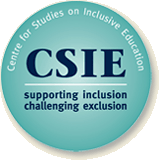
supporting inclusion, challenging exclusion
October 2010
CSIE contribution to the inquiry into the role of Ofsted
The Select Committee on Education called upon organisations and professionals to submit their views on what the purpose of inspections should be, the impact of the inspection process on improvement and the performance of Ofsted in carrying out its work. In its response, CSIE stressed that Ofsted should: retain its independence from the Department for Education; expand its remit to hear the views of all who live in the area of the service inspected; ensure that fundamental values upon which judgements are based are shared and understood in the same way by all inspectors; report on providers’ compliance with the single equality duty, when this comes into force, and continue to regard the judgment on equality and diversity as potentially limiting the judgment on the overall effectiveness of the provision; and hold providers to account when statutory duties are not complied with.
October 2010
CSIE contribution to the inquiry into the role of Ofsted
The Select Committee on Education called upon organisations and professionals to submit their views on what the purpose of inspections should be, the impact of the inspection process on improvement and the performance of Ofsted in carrying out its work. In its response, CSIE stressed that Ofsted should: retain its independence from the Department for Education; expand its remit to hear the views of all who live in the area of the service inspected; ensure that fundamental values upon which judgements are based are shared and understood in the same way by all inspectors; report on providers’ compliance with the single equality duty, when this comes into force, and continue to regard the judgment on equality and diversity as potentially limiting the judgment on the overall effectiveness of the provision; and hold providers to account when statutory duties are not complied with.
September 2010
CSIE contribution to the inquiry into behaviour and discipline in schools
The Education Select Committee asked how to support and reinforce positive behaviour in schools and wanted to find out more about the nature and level of challenging behaviour by pupils, the impact of such behaviour and how schools managed behaviour and discipline. They were also keen to know how special educational needs can best be recognised in schools’ policies on behaviour and discipline. CSIE stated that every child has a right to mainstream education within their local school – including those said to have special educational needs or those who have emotional or behavioural difficulties, so long as this did not interfere with the education of other children. Schools are inherently failing to uphold the principle of the best interest of the child (as stipulated in the Children Act, 1989 and The UN Convention of the Rights of the Child, 1989 and other pieces of legislation) when they temporarily or permanently exclude students on the grounds of behaviour or special educational needs. CSIE argued that educational provision needs to be re-organised and its delivery changed so that students are not temporarily or permanently excluded after highlighting the damage that such exclusions cause. CSIE recommends that schools work towards reducing and then eliminating all exclusions through support and interventions in teaching and learning arrangements. Schools may support and reinforce positive behaviour by valuing all members of their community equally and through treating every person in the school community as simultaneously a learner and a teacher. Rather than speaking of special educational needs and singling out individual children as misbehaving CSIE recommends that schools identify what barriers exist to all young people’s learning. In this way schools may ensure that provision is suitable for all learners. CSIE recommends that schools engage with their students in this work and involve young people in systems of peer support, mediation and conciliation.
September 2010
The extent of sex discrimination in access to compulsory education in the UK - CSIE response to consultation for the European Commission, DG Employment, Social Affairs and Equal Opportunities
CSIE believes that hidden discrimination in access to compulsory education is an issue in the UK. We take access to compulsory education to mean inclusive provision for children of all genders, at all levels of their school life. This includes children and young people who may challenge ‘conventional’ ideas of gender (including children who may identify as lesbian, gay, bisexual, transgender, intersex, genderqueer, gender questioning, gender variant and transsexual, as well as supposedly masculine girls and supposedly feminine boys). We believe that these groups of young people suffer not only direct discrimination and abuse within school but also indirect discrimination through being invisibilised. CSIE recognises that enforcing equalities legislation can prove challenging and recognise that many young people themselves, as well as some teachers, have deeply entrenched ideas of acceptable behaviour and aspirations that differ depending on gender identity. CSIE suggests that schools speak about gender broadly, and in depth, at all levels of school life in order that young people may become what could be called ‘gender aware,’ and thus capable of recognising, responding to and preventing gender based discrimination in all of its forms (for example, biphobia, homophobia, transphobia, sexism and misogyny). We believe that sex discrimination legislation needs to be understood more broadly as concerning the rights of people of all genders and see the consistent reduction of anti-sex discrimination initiatives into male/female binaries as failing to protect young people who may identify their gender in different ways. Until this wider remit is fully grasped sex-discrimination legislation is ostensibly unfit for purpose. We are delighted that the 2010 Single Equality Act, for the first time, offers legal protection to students who identify as transsexual but are keen that this narrow definition is also broadened.
Note: some of the documents on this page are in PDF format. In order to view a PDF you will need Adobe Acrobat Reader
Page last updated: Tuesday 22 August 2023